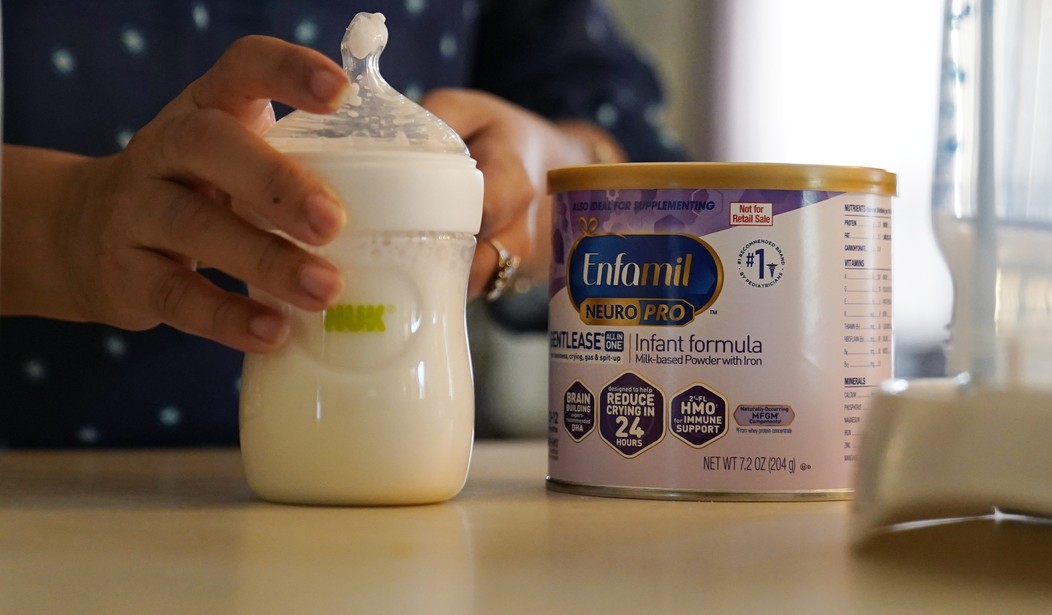Many factors contributed to the shutdown of an Abbott Nutrition formula manufacturing plant earlier this year and the subsequent baby formula shortage crisis, and now it appears the FDA's COVID-19 insanity was one of the reasons why.
Under normal circumstances, the FDA inspects baby formula plants once a year. In 2020 and 2021, citing a number of COVID related concerns, the agency neglected to visit most of the nation’s formula plants, including Abbott's Sturgis, Michigan plant, the largest in the country.
According to the Associated Press, part of why the FDA did far fewer inspections than normal in 2020 is because they relieved a majority of their inspectors to reduce the possibility of exposure to COVID-19. They did more than 800 inspections, however, for facilities that “carried a specific safety risk or were needed to produce an important medical therapy.” Only three of them were formula plants and Abbott didn’t make the cut, despite a history of product recalls and health concerns in their manufacturing plants.
The FDA even said formula manufacturers were “consistently identified as a high priority during the pandemic,” yet their 2 and a half year gap in inspections says otherwise.
During the gap in inspections, the Abbott plant’s hygiene procedures became incredibly lax, to the point that FDA Commissioner Robert Califf, after seeing the state of the plant earlier this year, said the conditions inside were “egregiously unsanitary” (via CNBC):
Recommended
Califf described bacteria growing from multiple sites in the facility, cracks in key equipment, leaks from the roof, standing water and a previous citation for inadequate handwashing.
He also said “the inspection results were shocking” and that the conditions of the plant made him “very concerned.” The plant had to take enormous measures to remedy the health violations discovered in the belated inspections (via CNBC):
Conditions at the facility were so bad that Abbott is required to complete hundreds of steps to come into compliance with food safety laws under a consent degree subject to enforcement by the Justice Department and a federal court.
A food safety specialist with the Center for Science in the Public Interest told the AP:
The FDA would have had more chances to catch these issues if they’d been inspecting during the pandemic. Certainly there was a price to pay for protecting their workers during that time.
Even after the shocking inspection results, the AP reported that “inspectors offered only voluntary suggestions for fixing the problems, and issued no formal warning.” In other words, a government agency refused to face an avoidable public health crisis head on.
The FDA said it would begin inspections at the Michigan Abbott plant in December, but it delayed until January after multiple plant employees contracted COVID.
Abbott didn’t shut down production until February when the CDC reported 4 infants who consumed their products contracted severe bacterial infections, known as Cronobacter. Two of these 4 infants died from their illness.
The FDA was aware of potential health concerns coming out of the Abbott plant as early as September 2021 (via CNBC):
The FDA first learned in September of an infant with Cronobacter infection who consumed powdered formula from the Abbott plant, and the agency received a whistleblower complaint about food safety violations at the plant in October. However, the FDA did not initiate inspections at the plant until January … The FDA reported the September case to Abbott and tested formula associated with the case but did not find Cronobacter contamination, according to Califf’s testimony. The agency learned of another infant infected with Cronobacter who consumed formula in December, but again didn’t find Cronobacter in the product.
The FDA and CDC claim they cannot conclude the “egregiously unsanitary” conditions at the Abbott formula plant directly caused these infants’ illness, but Califf said “the health agencies cannot rule it out” and are calling the correlation “highly unusual.”
The AP also reported what Califf said about the FDA’s role in the plant’s shutdown (via AP):
FDA Commissioner Robert Califf says regulators knew shutting down Abbott’s plant would create supply problems, but there was little evidence of urgency between when inspectors shuttered the plant in February and recent emergency measures to allow more imports from abroad.
As Townhall reported, the Biden administration actually did know that the formula industry was in jeopardy as early as a year ago.
























Join the conversation as a VIP Member